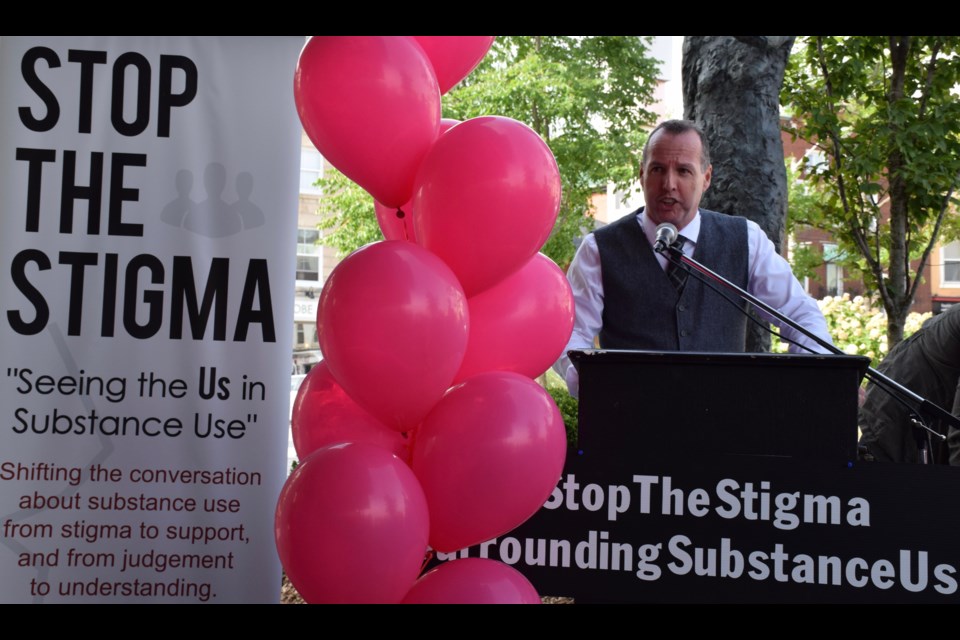Stigma is a mark of disgrace, says Nicole Anderson, clinical director of residential services for Stonehenge Therapeutic Community. It’s a form of discrimination that severely hampers the understanding of, and care for, those who struggle with addiction.
About 100 people — including Guelph’s mayor, the city’s chief of police, and members of city council — gathered at noon Wednesday in Market Square for the Stigma Rally. It was like a collective condemnation of the stigma against those who depend on substances to cope with life.
An effort to confront and break down the societal stigma associated with addiction, the event featured emotional presentations by a number of people who work in the trenches of substance use care in the city.
“I see the pain, suffering and struggle that people have every day when they face stigma,” said Raechelle Devereaux, director of programs and services for Guelph Community Health Centre. “What breaks my heart about health care is when people can’t access it.”
Addictions have been tucked away in the closet for a very long time, she said. Coming forward and going public with those addictions can be impossible for so many people. Doing so can limit one’s access to employment, health care, or housing. Addiction is seen as failure.
“It’s heartbreaking, it’s horrible,” said Anderson in an interview, when asked what it is like to witness the effects of this stigma. “There are so many barriers it puts into place for people trying to get help, trying to seek support.”
In his remarks, Guelph Mayor Cam Guthrie said addiction is a health problem, not unlike high blood pressure.
“We don’t shame people with high blood pressure,” he said. And yet, typically we shame those who live with drug or alcohol dependency, he said.
Guthrie said he is proud of the city’s integral role in the Wellington Guelph Drug Strategy. The strategy involves the development of a “4-Pillars” approach to tackle the areas drug problem – prevention, treatment, enforcement, and harm reduction.
Guthrie said the city is committed to ending stigma, recognizing that it gets in the way of access to treatment, housing, and compassion. He switched up his Facebook and Twitter accounts Wednesday to reflect the anti-stigma message.
Guelph Police Chief Jeff DeRuyter said the police service, as well, is working to combat the stigma faced by those involved in addiction, and is also a key partner in the drug strategy.
DeRuyter said he is inspired by the police officers who go beyond the call of duty to help those struggling with addiction find treatment and/or housing options.
“I’m proud of their empathy and compassion,” the chief said. When he mentioned the work being done by “Buzz,” a downtown officer, the crowd cheered and applauded the well-known officer.
“We don’t treat people who have other physical illnesses with discrimination,” said Anderson. “We don’t stigmatize them, but give them the help that they need. But people who have substance use or mental disorders, we stigmatize them. We don’t treat them the way they deserve to be treated. They are looked at as less than human.”
She said addiction is a coping skill. Substances are used to numb the pain of negative emotions and experiences. Stigma throws up barriers to those who need care for substance use.
Devereaux said community partnerships are the key to breaking down stigma and ensuring that proper care is forthcoming for substance users —care that they need and deserve.
